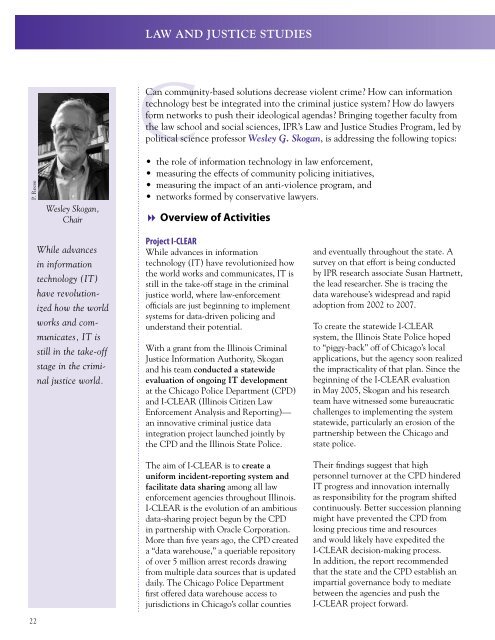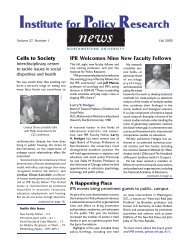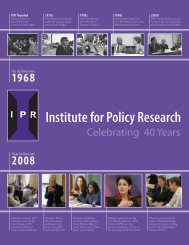pdf - Institute for Policy Research - Northwestern University
pdf - Institute for Policy Research - Northwestern University
pdf - Institute for Policy Research - Northwestern University
You also want an ePaper? Increase the reach of your titles
YUMPU automatically turns print PDFs into web optimized ePapers that Google loves.
Law and Justice Studies<br />
P. Reese<br />
Wesley Skogan,<br />
Chair<br />
CCan community-based solutions decrease violent crime? How can in<strong>for</strong>mation<br />
technology best be integrated into the criminal justice system? How do lawyers<br />
<strong>for</strong>m networks to push their ideological agendas? Bringing together faculty from<br />
the law school and social sciences, IPR’s Law and Justice Studies Program, led by<br />
political science professor Wesley G. Skogan, is addressing the following topics:<br />
• the role of in<strong>for</strong>mation technology in law en<strong>for</strong>cement,<br />
• measuring the effects of community policing initiatives,<br />
• measuring the impact of an anti-violence program, and<br />
• networks <strong>for</strong>med by conservative lawyers.<br />
8 Overview of Activities<br />
22<br />
While advances<br />
in in<strong>for</strong>mation<br />
technology (IT)<br />
have revolutionized<br />
how the world<br />
works and communicates,<br />
IT is<br />
still in the take-off<br />
stage in the criminal<br />
justice world.<br />
Project I-CLEAR<br />
While advances in in<strong>for</strong>mation<br />
technology (IT) have revolutionized how<br />
the world works and communicates, IT is<br />
still in the take-off stage in the criminal<br />
justice world, where law-en<strong>for</strong>cement<br />
officials are just beginning to implement<br />
systems <strong>for</strong> data-driven policing and<br />
understand their potential.<br />
With a grant from the Illinois Criminal<br />
Justice In<strong>for</strong>mation Authority, Skogan<br />
and his team conducted a statewide<br />
evaluation of ongoing IT development<br />
at the Chicago Police Department (CPD)<br />
and I-CLEAR (Illinois Citizen Law<br />
En<strong>for</strong>cement Analysis and Reporting)—<br />
an innovative criminal justice data<br />
integration project launched jointly by<br />
the CPD and the Illinois State Police.<br />
The aim of I-CLEAR is to create a<br />
uni<strong>for</strong>m incident-reporting system and<br />
facilitate data sharing among all law<br />
en<strong>for</strong>cement agencies throughout Illinois.<br />
I-CLEAR is the evolution of an ambitious<br />
data-sharing project begun by the CPD<br />
in partnership with Oracle Corporation.<br />
More than five years ago, the CPD created<br />
a “data warehouse,” a queriable repository<br />
of over 5 million arrest records drawing<br />
from multiple data sources that is updated<br />
daily. The Chicago Police Department<br />
first offered data warehouse access to<br />
jurisdictions in Chicago’s collar counties<br />
and eventually throughout the state. A<br />
survey on that ef<strong>for</strong>t is being conducted<br />
by IPR research associate Susan Hartnett,<br />
the lead researcher. She is tracing the<br />
data warehouse’s widespread and rapid<br />
adoption from 2002 to 2007.<br />
To create the statewide I-CLEAR<br />
system, the Illinois State Police hoped<br />
to “piggy-back” off of Chicago’s local<br />
applications, but the agency soon realized<br />
the impracticality of that plan. Since the<br />
beginning of the I-CLEAR evaluation<br />
in May 2005, Skogan and his research<br />
team have witnessed some bureaucratic<br />
challenges to implementing the system<br />
statewide, particularly an erosion of the<br />
partnership between the Chicago and<br />
state police.<br />
Their findings suggest that high<br />
personnel turnover at the CPD hindered<br />
IT progress and innovation internally<br />
as responsibility <strong>for</strong> the program shifted<br />
continuously. Better succession planning<br />
might have prevented the CPD from<br />
losing precious time and resources<br />
and would likely have expedited the<br />
I-CLEAR decision-making process.<br />
In addition, the report recommended<br />
that the state and the CPD establish an<br />
impartial governance body to mediate<br />
between the agencies and push the<br />
I-CLEAR project <strong>for</strong>ward.
















